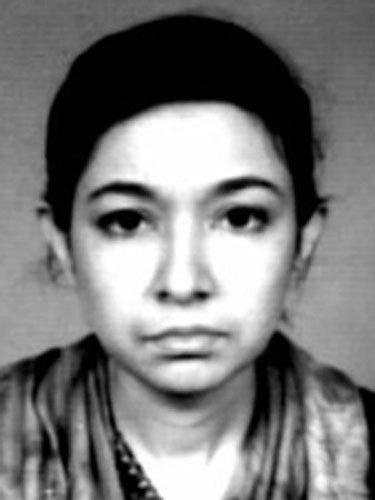Anger in Pakistan as 'missing' scientist resurfaces in US court on terror charges

A US-trained neuroscientist's appearance in a New York court charged with the attempted murder of American soldiers and FBI agents has sparked angry protests in her homeland of Pakistan.
Aafia Siddiqui, 36, is under suspicion of having links to the al-Qa'ida terror network of Osama bin Laden, and is the first woman ever sought by the US in connection with the group, which was behind the September 2001 attacks on the World Trade Centre and the Pentagon.
According to US officials, Ms Siddiqui, who reportedly studied at the Massachusetts Institute of Technology in Boston, was arrested in Afghanistan on 17 July in possession of recipes for explosives and chemical weapons, as well as details of landmarks in the United States, including in New York.
Yesterday's charges related only to events that allegedly took place shortly after she was taken into custody in the town of Ghazni. Ms Siddiqui is accused of grabbing hold of a rifle belonging to one of the soldiers who was trying to arrest her and firing two shots at the men, while shouting phrases like: "My blood be directly on your head."
None of the soldiers and FBI agents in the room with her were wounded, but the charges of attempted murder filed against her could carry a sentence of four years in prison if she is found guilty. In the course of the fracas she was shot in the arm after one of the US officers returned fire with a pistol.
"Despite being shot, Siddiqui struggled with the officers when they tried to subdue her. She struck and kicked them while shouting in English that she wanted to kill Americans," the complaint submitted to the New York court read.
The arrest of Ms Siddiqui threatens to strain already tense relations with Pakistan. Family members dispute the American version of events, insisting that rather than being arrested last month, she has in fact been held in secret prisons by the US military ever since her disappearance from her home in Karachi five years ago.
The Pakistani embassy in Washington DC, meanwhile, has made a formal request to the US authorities for consular access to Ms Siddiqui, who was being held in a high security jail in lower Manhattan yesterday.
"What a mockery that after five years in detention Aafia is suddenly discovered in Afghanistan," her younger sister Fauzia Siddiqui told a news conference last night, adding: "Aafia was tortured for five years until one day the US authorities announce that they have found her in Afghanistan, which shows how they abused their power and tortured an innocent woman without committing any crime."
US investigators believe that Ms Siddiqui has ties to two alleged high ranking al-Qa'ida operatives currently being held in Guantanamo Bay. They say that she was given an assignment in 2002 by the militant Ali Abd al-Aziz Ali, a nephew of the self-confessed 9/11 mastermind Khalid Sheikh Mohammed, to prepare papers for the entry into the United States of another al-Qa'ida operative.
In spite of the materials allegedly found on her after her arrest last month, officials said they have no evidence to suggest that she was on the point of becoming operational herself, or of carrying out any attacks in the short term.
Her lawyer, Elaine Whitfield, said yesterday that she would demonstrate that her client has no links to terror groups whatsoever. She accused the US government of trying to turn her client into "a poster child for the changing face of al-Qa'ida".
The Pakistani embassy made its request for access to Ms Siddiqui on Monday. Meanwhile, the Human Rights Commission of Pakistan (HRCP) urged the Pakistani government to intervene and secure her release. "Dr Aafia's case is a reminder of the grave injustice done to God knows how many Pakistanis in US detention facilities in Bagram in Afghanistan, Guantanamo Bay and elsewhere, who have been listed as missing," it said.
Join our commenting forum
Join thought-provoking conversations, follow other Independent readers and see their replies
Comments
Bookmark popover
Removed from bookmarks